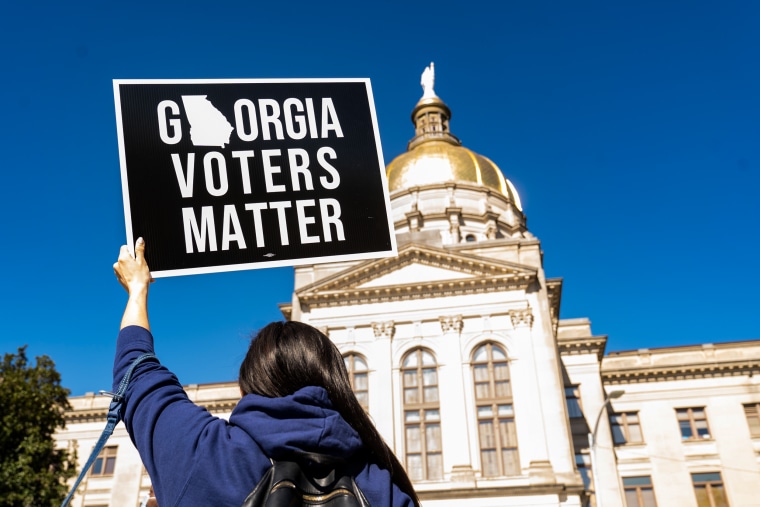A federal trial over the legality of Georgia election rules began in Atlanta on Monday, giving advocates a chance to challenge the constitutionality of regulations they say make it harder for Black voters to cast ballots.
Voting rights advocates led by Fair Fight Action first filed the suit in 2018, the year the group's founder, Stacey Abrams, lost her campaign for governor. She blamed her loss on voter suppression perpetrated in part by her Republican opponent, then-Secretary of State Brian Kemp, who won the race. Kemp and Abrams are again competing in a heated governor’s race as the state's Republican leaders continue to enact restrictive voting laws.
Allegra Lawrence-Hardy, an attorney for Fair Fight Action and other plaintiffs, said at a news conference Monday night that her team told the court "how, through deliberate choices, the secretary of state and State Election Board have erected a series of roadblocks — roadblocks that impose unjustifiable burdens on eligible voters and would-be voters in violation of both the Constitution and the Voting Rights Act."
“The practices challenged in this case permeate every stage of the voting process, and they compound the obstacles Georgians face when trying to exercise their fundamental right to vote," she added.
Advocates initially sought to challenge the election code broadly with a sweeping lawsuit, but the judge narrowed the scope of the suit significantly ahead of the bench trial. The trial will focus on several election policies and practices, including absentee ballot cancellation practices, citizenship verification policies and the state’s “exact match” rule, which required voter registrants to provide additional identification if their names did not match the names on other government records. The rule disproportionately affected voters of color in previous elections, according to a 2018 analysis by The Associated Press.
The trial, which is expected to last nearly a month, has a long list of witnesses, including state faith leaders and politicians.
Sen. Raphael Warnock, D-Ga., and Kemp, the governor, are listed as witnesses for the plaintiffs, court documents indicate, while the state's defense has included Republican former Sen. David Perdue on its list.
Secretary of State Brad Raffensperger, the lead defendant, has vowed to appeal the suit to the U.S. Supreme Court if advocates succeed at trial.
Abrams' "3-year ‘stolen election’ campaign has been nothing more than a political stunt to keep her in the national spotlight, and it’s a disservice to Georgia voters," he said in a statement. Abrams is not a plaintiff or listed as a witness.
Raffensperger, who is running for re-election, said in a briefing Monday morning that his office is referring 1,634 people for investigation after they tried to register to vote and were blocked by citizenship checks that the Fair Fight Action suit is challenging. Raffensperger's spokesman, Walter Jones, said the bulk of those attempts occurred during or after 2018 but that some dated to years earlier.
In Georgia, voter registration applications are checked against state citizenship data, and people who are flagged as potential noncitizens are asked to provide proof of naturalization or citizenship before they can cast ballots. Voting rights advocates argue that the citizenship checks create additional barriers to the ballot box for newly naturalized voters.

